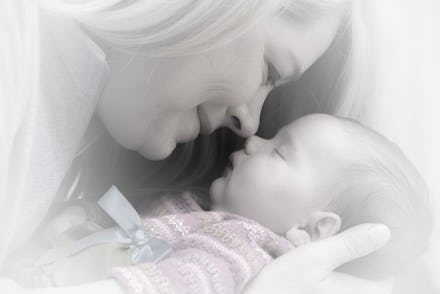Here's Why New Moms Post an Obnoxious Number of Photos of Their Kids on Facebook

Social media might be cool for routinely stalking girls you envied in middle school to see if your life has finally gotten better than theirs, but it can also be a cesspool of wackadoo political bickering, costly aspirational lifestyle porn and straight-up envy.
Research has shown that Facebook, Twitter, Instagram can have negative consequences for users' relationships, body image and anxiety levels, and young adults who spend more time on social media are also more likely to experience depression. Unfortunately, that might be especially true for new moms — particularly the ones who share baffling numbers of pictures of their kids on Facebook.
Turns out, all those baby photos might be part of an unfulfilling quest for approval that leaves many mothers feeling they aren't "doing motherhood" right, according to a study published in the recent issue of Sex Roles. Researchers found women who frequently post photos of their new babies on Facebook could be more susceptible to depressive symptoms within their first year of parenthood, especially if people aren't giving them the validation they'd hoped for.
In a poll of a very specific group of 127 new moms — mostly married, highly educated women with full-time jobs — researchers discovered women with a penchant for flooding people's feeds with baby photos had a strong desire for affirmation of their parenting abilities from their Facebook friends.
In fact, the study found that mothers who posted most frequently about their kids had stronger emotional reactions to any "likes" and comments their photos received than women who posted fewer infant images, and were more likely to feel social pressure to be a "perfect" mom — or, at least, to seem like one on the internet.
Seeking validation from Facebook isn't inherently bad, according to study author Sarah Schoppe-Sullivan, a professor of human sciences at Ohio State University. But for some of the new mothers she and her colleagues interviewed, the reliance on social media to develop and affirm their identities as good parents could be problematic.
"I think that people use social media to seek validation for lots of things — appearance, careers, romantic relationships," Schoppe-Sullivan said in an email to Mic. "Motherhood is such a socially valued role that it makes sense that new mothers would want to be recognized as good mothers. But whenever you seek validation, you may not get enough of it, thus setting you up to feel worse."
Mothers who did post on Facebook more frequently than other study participants reported experiencing more depressive symptoms nine months after having a baby. Yet they seemed set up for feelings of inadequacy long before that: When participants were in their third trimester of pregnancy, they were asked to measure how much they agreed with the statement, "Only if I am a perfect parent will society consider me a good parent."
Unsurprisingly, the women who believed the minimum for good motherhood was perfection, particularly perfection in the eyes of others, were most likely to tie their identities to becoming parents and to put more stock in social media comments about their kids. That makes sense, the researchers noted, given society's exceedingly high expectations for mothers. Still, it's notable that working women sought such validation for parenting, and not their other pursuits.
"These are not stay-at-home moms in our study," Schoppe-Sullivan said in a statement. "They have jobs outside the home that can also provide validation, which makes our results even more interesting. They have other successes to point to for validation."
Of course, society treats all women like baby-making human incubators, so other accomplishments don't matter when you could, ahem, should, be having and raising children. In the face of that message, it's no wonder new mothers feel such pressure to make sure everyone knows they're doing a great job of fulfilling their destiny. It's also no wonder trying to seem perfect is leaving them feeling comparatively more depressed — because the "perfect mother" who "has it all" is a bullshit stereotype in the first place.